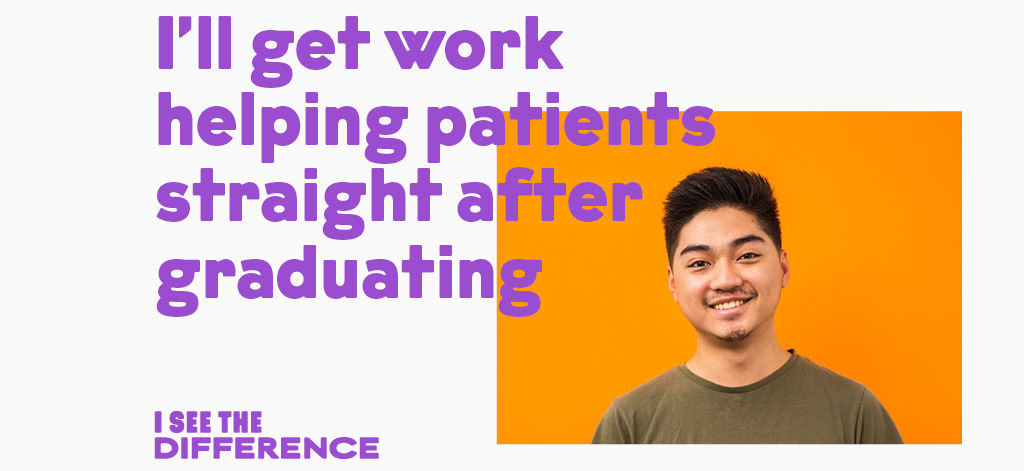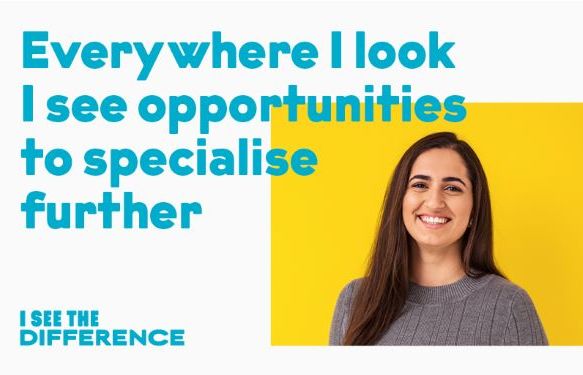A new report into the recruitment of mature students into nursing midwifery and allied health courses highlights the further work required to promote careers in orthoptics.
The report was commissioned by the Office for Students (OfS) as part of their ongoing strategic interventions in health education disciplines (SIHED), which looks to increase recruitment to higher education courses in small specialist allied health disciplines.
Orthoptics has been identified as one of four allied health professions particularly under threat from low recruitment. Following funding reforms that meant nursing, midwifery and allied health professional students had to pay fees, numbers of enrolled orthoptics students dropped by 8.2% in 2017/18.
The report identifies a particular problem in attracting mature students to courses in orthoptics. Courses in orthoptics have the lowest percentage of mature students of all the AHPs, with only 6.7%of new students being over the age of 25.
Understanding orthoptics
We have previously identified a lack of awareness of what orthoptists do as a key factor hampering recruitment. The report identifies a very low awareness, both in prospective students but also in those in a position to promote potential careers. One academic reported the difficulties they had faced encouraging FE colleges to promote the profession, owing to a lack of understanding of what orthoptics involved.
BIOS have already started to work to address this issue at BIOS. We recently launched the public facing section of our website, providing a hub for those seeking more knowledge on Orthoptists and the work we do. We are also currently developing our pages for prospective students, to provide more relevant advice and resources for anyone considering studying orthoptics.
Further, the OfS’s SIHED programme identified the lack of opportunities for prospective students to shadow an Orthoptist as a key factor deterring applicants. As a result funding was provided for the appointment of Orthoptist Carly Hegarty on secondment to work with universities and NHS trusts to facilitate these opportunities.

More to be done
However, we entirely agree with the recommendation of the report that there is still more to be done. In particular, there could be more promotion of the employment benefits of working as an AHP, such as high levels of employment and suitable working hours for those with families. There is also much to be gained from a greater emphasis on the diversity of the work done by Orthoptists; even where prospective students know about Orthoptists, they often have a very limited understanding of the varied work we do.
We would also echo the recommendations of the report around clarifying the financial and education pathways into the profession. It was identified that students do not always fully understand the student loans system and more work is necessary to promote the support for low income students or those with children, though the Learning Support Fund.
Another recommendation of the report is to work on supporting diversity in allied health professions. Orthoptics has a relatively positive record in attracting students from a BME background, making up 46.7% of the most recent cohort. However, the proportion of male students was 6.7%, one of the lowest proportions of any AHP. More could certainly be done to ensure that the messaging we are sending out reflects that orthoptics is a career accessible to all.
Practical barriers
The report also identifies a number of practical barriers to mature students in particular. The difficulty of gaining placements means that students are often required to take them over an extremely wide geographical are. This is likely to be particularly restrictive for those with dependent families, and has been made more difficult with the removal of the payment of placement travel costs from 2017/18.
BIOS have already made efforts to increase placement capacity, via our education and professional development committee. Courses at all three UK universities are now able to offer a wide and diverse placement experience and are at the point of having a surplus in capacity in some areas which helps to address emergencies and unforeseen circumstances.
There is however a wider geographical issue for orthoptics likely to restrict access to mature students. Orthoptics is only offered at three universities in the UK, in Sheffield, Liverpool and Glasgow. Younger students from areas without courses, such as the South of England, may be willing to relocate, but this is often not a possibility for mature students, particularly those with dependants.
BIOS will continue to work to promote our profession, and will work alongside others where changes are needed to make Orthoptics seem like a realistic and accessible career for all.
You can read the full report here.
